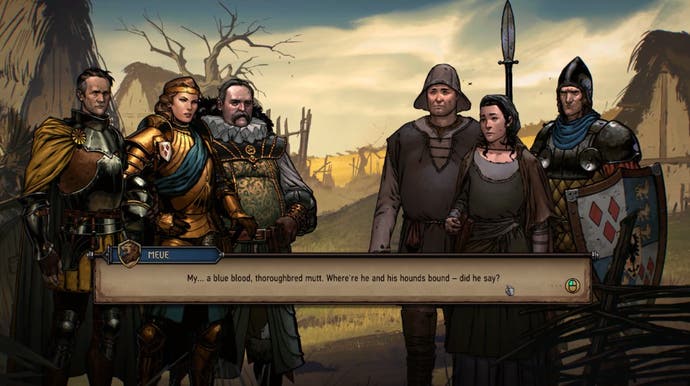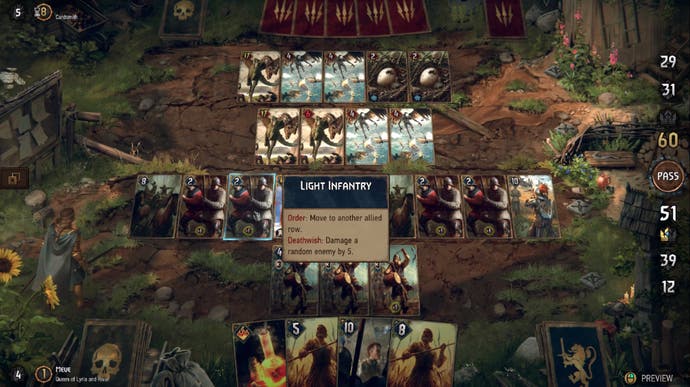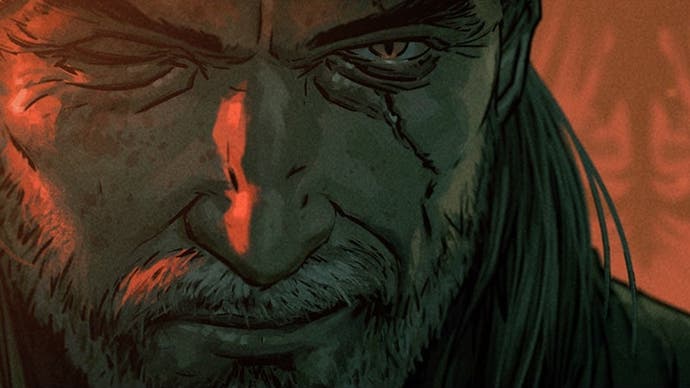Is Thronebreaker the new Witcher tale we seek, or is it bloody barren?
He's a card.
Card games haven't done story on this level before. With Thronebreaker: The Witcher Tales, we're not talking about a bolted-on campaign, we're talking about a whole separate game - a 30-dollar, 30-hour Witcher story with more lines of dialogue than The Witcher 3: Wild Hunt expansion Hearts of Stone. Thronebreaker has 77 side quests, 20 possible end-states and is directed by Mateusz Tomaszkiewicz, lead quest designer on Witcher 3 (and also brother of Witcher 3 game director Konrad Tomaszkiewicz).
The message is clear: the people who made one of this generation's most celebrated role-playing games have made a new Witcher story. You'd be forgiven for not realising it was a card game - the title Thronebreaker: The Witcher Tales doesn't even mention Gwent, the card game upon which it is based. Then again, 'more Witcher' is a far tastier proposition. But can a card game reach the same storytelling heights?
I played Thronebreaker for two hours earlier this week, which wasn't long enough to gauge whether the story will rival the Bloody Baron in terms of gut-rending oomph, but was long enough to sense a similar dirt-smeared grit in the world around me, and to be reassured dark and mature story is front and centre of what Thronebreaker is trying to do. At one point I ordered a defeated rabble - whose only real crime had been a few wrong words - to be hung, for example. I did it because as a monarch - Queen Meve - I didn't want to show signs of weakness, but when a grubby onlooker then scorned me (brave, considering what I'd just done) for my cruelty, I felt awful.
These decisions and the story play out on a campaign map which looks like it's been pulled from the pages of a graphic novel, and across which your hero tramps. It's a bit like a Heroes of Might & Magic game in this regard - you can even equip Meve with new trinkets to up her power. You find people to talk to, quests to undertake, all kinds of points of interest to investigate and, of course, monsters and human monsters to defeat.
Bump into anything battle-y and it is decided by a game of cards, and to keep encounters varied, Thronebreaker employs special rules. For instance, one encounter wasn't a battle but a rock slide, and instead of enemies I fought boulders, which tumbled a row closer each turn. To win I had to stop the boulders reaching Meve, at which point she would presumably be crushed like a can of Coke and not be much use.
In another encounter I fought bandits but was really trying to prevent horses making off with stolen goods. If three escaped: defeat. But they were armoured and didn't stick around long. It doesn't sound difficult, but it was. By limiting playable options and time, Thronebreaker pushes for precision, often unforgivingly, and I was surprised by how challenging I found it - not that I'm a Gwent expert, but I do dabble. I was ready to give up when my fifth attempt proved successful. If this sounds daunting, however, there's a Story difficulty available, which boosts the power of your cards and also lets you skip encounters if you wish.
Thronebreaker plays a slightly different game of cards to Gwent in public beta. It uses the upcoming Homecoming version of Gwent, which rolls out with Gwent 1.0 and Thronebreaker on 23rd October on PC and on 4th December on PlayStation 4 and Xbox One.

In Homecoming, boards are 3D and leaders stand upon them, issuing commands and generally posturing. Rows are reduced from three to two a side, and new mechanics have been introduced. New Order abilities can be used at any time rather than specifically upon deployment or death, for example, and some attacks are now limited by range, making row placement a real concern. That's by no means all of the changes, but to discuss every one would take a long time. Suffice to say, Gwent is refreshed and looks and plays better than ever. And if you haven't played since the mini-game in The Witcher 3: Wild Hunt, then goodness you're in for a treat. The fundamentals might be the same but it is infinitely deeper, a puddle turned into a sea.
Thronebreaker's cards, however, are only for use in Thronebreaker. Because they can be improved and powered up, they cannot carry across to Gwent for fear of upsetting the multiplayer balance there, although there will be 20 Thronebreaker-inspired cards added to Gwent which you get immediately when buying Thronebreaker, or earn via crafting or opening kegs (card packs) otherwise.
Crafting and improving your cards in Thronebreaker happens at your travelling base camp, which you can also expand and improve. Doing so depletes your gold, wood and recruit resources, of which you can find more as you explore. But bolstering your army is more complicated than filling it with more powerful cards, because more powerful cards have a higher recruit footprint, and keeping 25 cards (your minimum) under your 125 recruit limit is a very tricky balancing act. Gwent will also apparently introduce a recruit limit, but the team wouldn't tell me what it will be.

As well as standard soldiers you can recruit talking, storied companions. These are represented as gold cards but they play a role outside of the battlefield, too. They appear in talking-head dialogue sequences - where characters stand largely still, undulating slightly, while their mouths yap energetically - and hole up in your mess tent waiting to be talked to. They're not characters I recognise, although you might if you're familiar with the books, but there's potential for familiar faces to appear along the way. The Thronebreaker team went coy when I - like everyone else, apparently - asked whether Geralt will show up.
Dilemmas drain resources too. Take a wagon axle snapping for example. You could ride on and ignore it at no cost; you could have someone else deal with it for a bit of wood cost but gold gain; or you could pay for a new axle and increase troop morale. Morale is important; everything you do will affect it, and if you let it sink too low, bad things are bound to happen. These choices layer on top of bigger choices (like hanging people, Bertie, you monster) which will echo through the game's acts as they unfold.
In Thronebreaker there are, then, many things to juggle, although it's tricky trying wrap your head around it all at once. It made for a bumpy start. But I'm sure as time wears on and mechanics sink in there will be depth to happily absorb you and characters and story to wrap yourself up in. After the first act, I'm told, Thronebreaker really gets going.
The glimpse of Thronebreaker I got was encouraging. Most importantly, it nailed the distinct personality of The Witcher, and the quality of writing, storytelling, voice acting and presentation was high. It wasn't The Witcher 4 and nor should you expect it to be, but as a new story in the same universe it's exciting nonetheless, and as a card game may be unprecedented.


